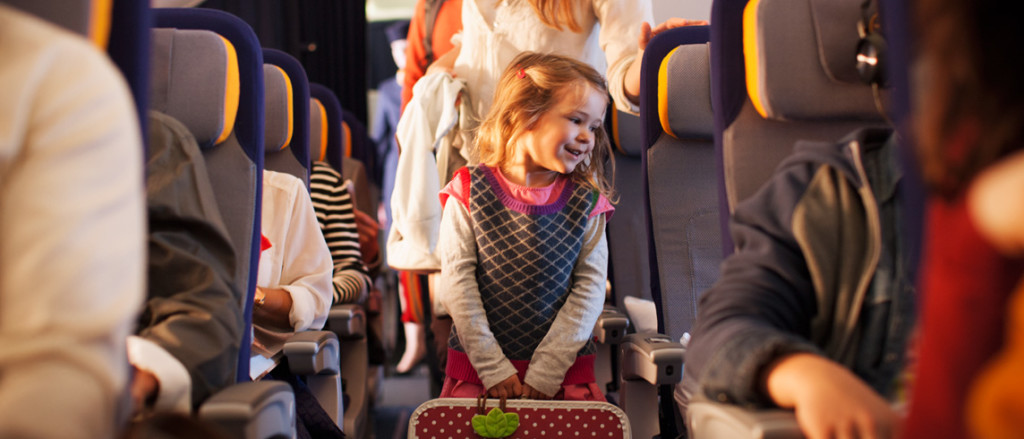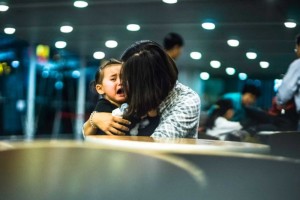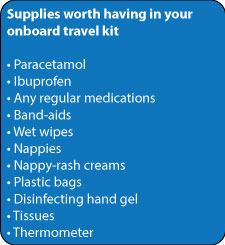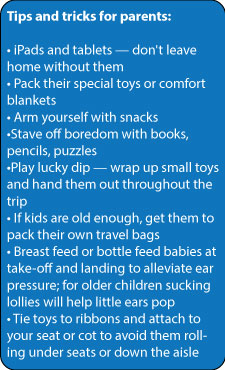Should parents give their children drugs to help them sleep on long-haul flights?
ABC Health & Wellbeing | by Katie Franklin | 12 July 2017, Updated 14 July 2017 | ABC.net.au

The thought of traveling with small children on long-haul flights can fill even the most laid-back parents with dread.
Will my child sleep? Will they run up and down the aisle or kick the seat in front of them?
And then there’s the other passengers. Will I get knowing smiles or terrified sideways glances by childless, carefree young couples?
This journey into the unknown will have parents asking another question: Is it OK to give my kid a little something to help them sleep during the flight?
It’s a polarizing topic and a quick search of parenting blogs and forums will surface posts like:
“I’m seriously considering Phenergan for our next flight. I mean, I’d be doing it for the good of the other passengers. It’s like a community service. Does that make me a bad mother?”
Or this:
“I personally wouldn’t drug my kids to fly. I’ve got two active boys and have flown many times solo and it’s manageable without the medication.”
Some parents swear by antihistamines for inducing children to sleep. Antihistamines are drugs used to treat allergies and some cause drowsiness. But Dr Joanne Ging, pediatrician at the Children’s Hospital at Westmead in Sydney, warns against this practice.
“Unfortunately [children under two] are the ones you’d most likely want to give it to because they are the ones you can’t reason with, but the risk of complications is too high,” she says.
Professor Lisa Nissen, a pharmacist and head of the School of Clinical Sciences at the Queensland University of Technology, says the sedate debate divides parents and professionals alike, but recent research shows giving sedating antihistamines to children under six is not recommended.
“There can be complications with those medications for younger children. They can have effects on breathing, and because they are very sedating can cause some issues with quite small children, particularly children under two,” she says.
“We have always been cautious in giving them to young children, but now there’s an increasing amount of evidence that we probably shouldn’t be giving them to children under five or six without a particularly good reason or assessment.”
So what are the risks?

There are lots of side effects.
The biggest concern is unusually slow or shallow breathing, and this can potentially be fatal.
Other side effects include dizziness, slurred speech, dry mouth, blurred vision and paradoxical stimulation (in other words, your child becomes hyperactive).
“They have tremors, hallucinations, they look like they’ve had other types of medication because instead of having the sedation effect it has the complete opposite effect,” Dr Ging says.
“And the issue with that on a long-haul flight is that you can’t do anything about it. If something really terrible like an overdose has occurred there is no way of getting assistance to that child.”
But my doctor said it was OK?
Brisbane mother Katherine spoke to her GP about what medications might be available to help her survive her first long-haul flight as a parent — a grueling 18 hours (not including the stopover) to America’s Midwest.
The young mum, who asked not to be named in full for fear of a backlash, says her doctor suggested an antihistamine with sedative effects as an option if her nine-month-old son became distressed at not being able to sleep during the flight.
 “The thing I thought was interesting was she didn’t prescribe it. She wrote it down on a piece of paper and said ‘take this to the pharmacy’,” Katherine says.
“The thing I thought was interesting was she didn’t prescribe it. She wrote it down on a piece of paper and said ‘take this to the pharmacy’,” Katherine says.
“She said, ‘Don’t tell the chemist it’s for your baby, say it’s for you because they might not sell it to you if it’s for your baby’.”
Associate Professor Mike Starr, a pediatrician at the Royal Children’s Hospital Melbourne and head of the RCH Travel Clinic, says he is aware some GPs prescribe or recommend antihistamines for sedation but that he also advises against it.
“Antihistamines are medicines that are used for a particular purpose to treat allergies, and some of them happen to have the side effect of sedation, and so people are giving a medication that has other effects to try and sedate their child, and that to me is not a good thing to do,” he says.
He says it’s better to use a true sedative because “that’s what it’s designed for”.
For Katherine and her husband, one of the side effects of giving her baby an antihistamine was a mid-air “poo-plosion”.
“We gave it to him partway through the first flight and that was fine. It made the flight from Brisbane to LA more bearable,” she says.
“But I’d forgotten that it could have a bit of a laxative effect, so on the flight to Minnesota we had to throw away the onesie.
“And the flight attendants were not very helpful … I have poo on my arm and it was sort of like, ‘you’re in the way of our serving food’.”
Are there any risks with sedatives?
Professor Starr says while it is always better to use non-medical things to keep a child happy, in some cases he will suggest a sedative, which is a prescribed medication.
“I think that it is reasonable in certain age groups and certain long-haul flights, depending on their health and other factors, for parents to give their children some form of sedation to take the edge off their excitement or agitation so they can settle off to sleep and arrive at the other end and not completely be a mess,” he says.
“A long-haul flight can be really distressing for the child and for the parent, and for the people around the child, and therefore possibly even more so for the parents because they’re trying to keep their child quiet and not disturb everyone around them.”
Professor Starr says a sedative should only be used as a last resort, and if parents choose to use medication, they should test it at home before they travel.
“I prescribe a dose to be given at night at home before they travel. And that’s not to see whether it works, that’s to see whether there is an adverse effect,” he says.
“The last thing you want is to do that for the first time on a flight and for it to have the opposite effect.”
Professor Starr says the sedative he prescribes can cause paradoxical agitation in very rare cases, and this is far more likely with antihistamines.
What will the other passengers think?
Child psychologist Kimberley O’Brien, of the Quirky Kid Clinic, says the thought of being judged by other passengers can trigger anxiety in parents that leads them to consider medication.
“You don’t want to disturb other passengers, but I think medicating your kids is quite an extreme approach.”
Dr O’Brien says parents will sometimes make decisions based on the experiences of friends and family, but they should do their own research before giving medication to children.
“I don’t think we should normalize it. I think we should say it’s not an OK approach — doping your children, why would you do that?”
If medication isn’t an option, what can parents do?
Be glad you’re raising a kid in the technology age.
Most airlines provide entertainment on demand, but it’s wise to take your own device preloaded with your child’s favorite movies, games, music and books.
But isn’t excessive screen time a bad thing?
 Parents should give themselves a break on this front, says Dr O’Brien.
Parents should give themselves a break on this front, says Dr O’Brien.
“As an alternative to medication, screen time is a good option for long flights. Of course, there will be some withdrawal symptoms or reactions to excessive screen time, more emotional reactions and craving more screen time when [children] get off the plane … but I think [the consequences] are probably less to the child’s health than using medications.”
Child psychologist Dr Fiona Martin says children will be children whether they are on a plane or in the park, but good preparation can help alleviate the stress of traveling with toddlers and babies.
“Plan in advance, have activities for them that are age appropriate, and have nice snacks available. Be organized and keep everything in perspective,” she says.
That advice is echoed by Brisbane mother Katherine.
“It’s like a Brazilian wax — it isn’t going to be fun but it’s something you want to do, so you grit your teeth and then it’s over.”
And try and stay cool, people. Children are like animals, they can smell fear, says Professor Nissen who recently travelled to Europe with her two children, aged three and five.
“They can tell when you’re anxious and if you’re more relaxed about the process and what it’s going to be like, then I think that will help them feel less anxious about the trip and the process as well.”
How can parents reassure other passengers?
Break the ice, says Dr O’Brien, and let them know you’re feeling anxious about the flight and you’re hoping things go well.
And if they’re interested, add a baby briefing to the safety briefing.
“Give them an outline of what could be expected,” Dr O’Brien says.
So tell your plane neighbor about your baby’s sleep routine and explain that you’ll need to get up from time to time to settle them.
How can passengers help parents out?
Don’t expect too much of traveling tots, says Dr Martin.
“They don’t have the ability to always regulate their behavior because they don’t understand all the time. They’ll behave according to their age, so be respectful of their right to be children.”
Professor Nissen says sometimes what looks like a misbehaving toddler is actually a child in pain.
“Little people’s ear, nose and throat stuff is quite different to grown-ups, and they do get quite a change in pressure in their eardrums related to flying that makes them quite uncomfortable. It makes them ratty and they may not be able to articulate what it is [wrong].”
So if your toddler is on the verge of a tantrum or your newborn just won’t settle, the main point to remember is RELAX. Not everyone will be judging you.
“In most cases I think other parents and people on the plane understand that kids cry sometimes and usually you find people will give you knowing looks and lots of sympathy,” Dr O’Brien says.
“If you can see a parent struggling to try and settle a child, I think sometimes just talking to them and giving them that reassurance is key when parents are feeling really stressed, and generally no judgment.”




